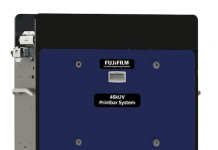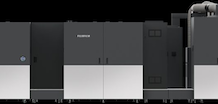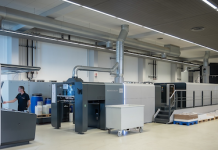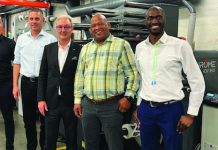Kemtek Imaging Systems commenced with the first part of its national Printology 18 roadshow at the Johannesburg Country Club in Woodmead on 23 October, held in collaboration with partners Komori, Fujifilm, Baldwin and Siegwerk Ink.
Print service providers were invited to hear a series of technical presentations from industry veterans, discussing the direction in which print is headed, with emphasis on a number of trends, particularly in the context of sustainable business practices in a world of economic uncertainty.
These include keeping electricity costs down, maintaining a low carbon footprint and the need to adapt to changing market conditions. Put shortly, PSPs want to do more for less. Speakers at the event presented means in which these can be achieved.
During session one, director of distributor sales Komori International Netherlands BV Tony Carter spoke about the benefits of low energy curing/drying and its benefits such as reduced ink volumes, less power (and thereby less cost), less maintenance and higher performance. He mentioned that South Africa has been slower at embracing the concept than the rest of the world. Komori has a number of options in low energy curing available which include H-UV, H-UVL and eUV. Carter also said that low energy curing will continue to increase its market share at the expense of conventional printing.
Ulrich Sause of AMS Spectral UV delved deeper into the concept of H-UV, illustrating that no powder coating is required when using H-UV technology, a higher gloss effect is created and that H-UV inks become dry in the printing process before reaching the pile. Innovations from AMS Spectral UV, a Baldwin Technology company, are used in Komori technology.
MD general manger of graphic systems division Fujifilm South Africa Takeo Hata spoke of other options in sustainable printing, namely his company’s processless CTP plates such as Superia ZD, which eliminate the processor, chemistry, gum and water elements required in conventional printing. The plates have software tools such as colour control, which ensure ink savings. Hata also spoke about Fujifilm’s newer versions of its B2 inkjet technology, as well as Fujifilm’s Illumina LED UV curing technology used in the production of labels.
Session two included Siegwerk South Africa MD Jonathan Johnstone addressing his company’s K-Supply Komori H-UV inks, dubbed as a breakthrough in UV offset inks. The inks, which are ISO 2846 / PSO compliant feature little to no absorption through paper, thereby ensuring low ink consumption during the printing process. The inks meet all Komori requirements and provide a higher image definition. Johnstone also provided examples of numerous customer testimonials.
Tony Carter returned towards the end of the evening to discuss packaging and what lies ahead for those in the industry. With the packaging industry continuously experiencing year-on-year growth, there is a constant need to look for further innovations. While print volumes continue to grow in emerging economies, industrialised nations are facing a rapidly changing and highly dynamic environment.
Carter explained that the market needs to change because commercial printers have nearly identical business models, which results in too little customer value to remain viable, even though print as a process retains a good deal of viability. The solution is to change the business model, as every successful business strategy is based on being different. Thinking out of the box can make a difference.
Komori believes it can help, in terms of production output, flexibility, allowing new markets to be developed and developing designs that offer uniqueness. One such example is its reverse printing, with the ability to print on both sides of a board without compromising quality or production output.
The sessions provided insight for attendees, some of whom had experienced limitations in their businesses, such as having to use excessive powder coatings, as well as excessively high ink consumptions. Printology 18 Johannesburg concluded with a brief Q&A session, followed by guests receiving makeshift VR googles, which once connected to their phones with a quick Google search, immersed them in a virtual walk-through tour of the Komori Innovation Centre in the Netherlands. During drinks, dinner and networking, guest could also see various samples on display. The event was also hosted by Kemtek in Durban on 24 October as well as Cape Town on 25 October.





















